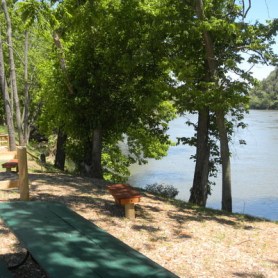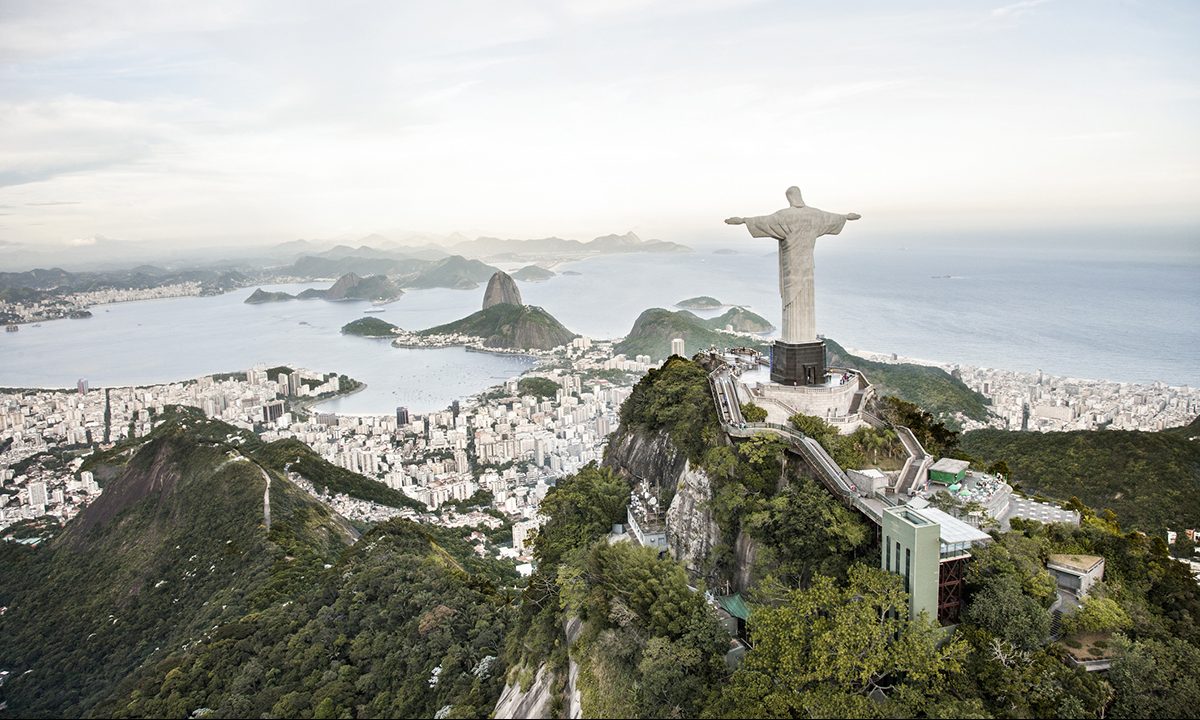

Exploring the world off the beaten path can lead to amazing discoveries, and some of those paths can also lead you to some breathtaking sights. If sightseeing is your thing, this is the list for you. Here are 15 colossal statues around the world to add to your travel bucket list.
Videos by Outdoors with Bear Grylls
Colossal: (adjective) To be more than twice life-size
1. Great Sphinx of Giza, Egypt
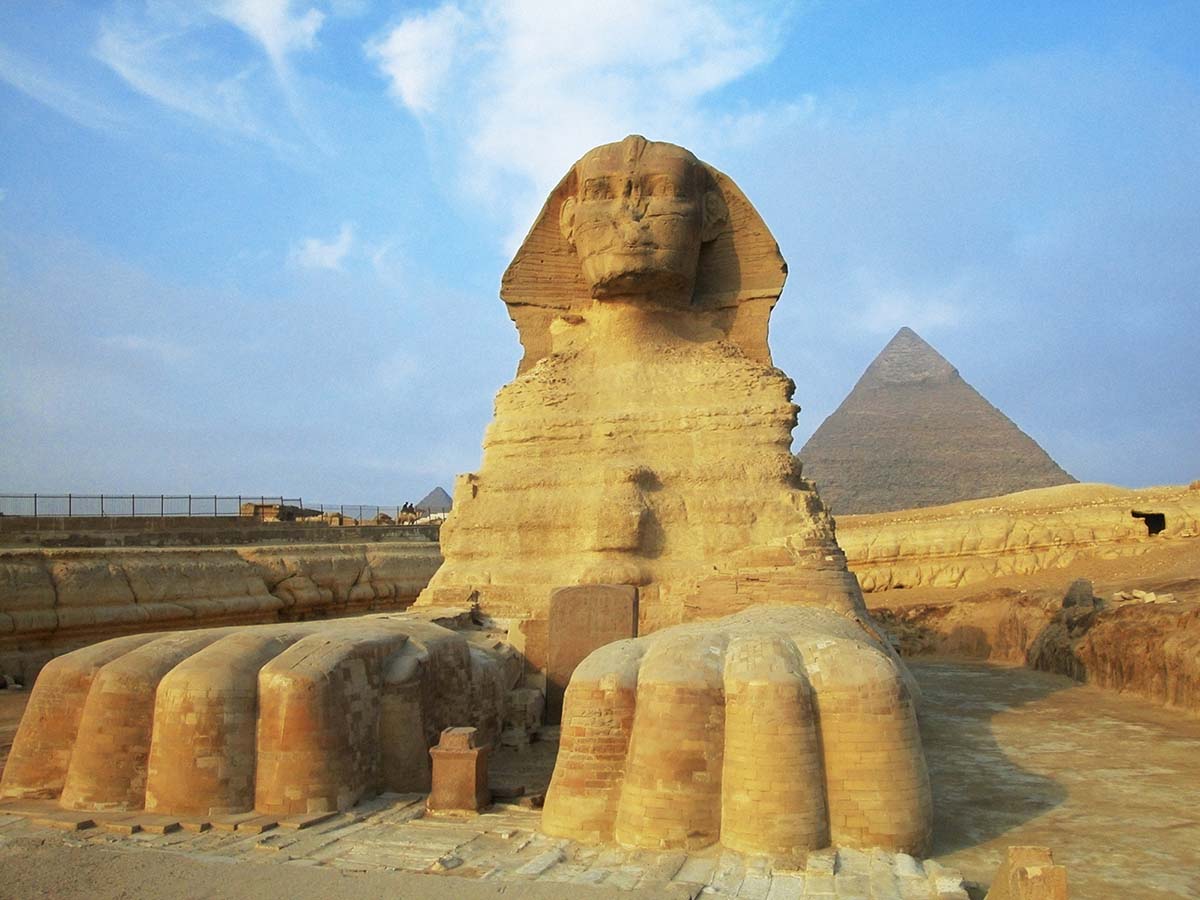
This iconic Egyptian sculpture has an air of mystery, which is just one of the reasons it should be on your to-see list. Originally thought to have been constructed in 2500 BC, recent studies suggest that it could have been built in 7000 BC.
Located in Giza near the pyramids, the Sphinx was carved from a single piece of limestone rather than assembled out of stone bricks. At 66 feet tall and 240 feet long, it is one of the oldest monolithic sculptures in the world. The Sphinx looks into the rising sun, because lions were a solar symbol in ancient Egyptian culture.
No one knows what the Egyptians called their sculpture, but we do know the name “Sphinx” came from the Greeks, because the sculpture resembled one of their mythical monsters. The Sphinx is connected to the Pyramid of Khafre.
2. The David, Italy
Michelangelo’s David was the first colossal sculpture made since antiquity. Made from one slab of marble, David was no easy feat. In fact, two artists prior to Michelangelo had already tried their hands at creating this sculpture. Donatello attempted the sculpture from the same slab of marble 50 years before Michelangelo began the project.
Located in Florence, this sculpture is one of the most well known to come from the Renaissance period. There have been many plaster and bronze recreations of David, but at 12,500 pounds and a gigantic 17 feet tall, the original is truly something to behold. If you’re traveling with an art lover through Italy, you will not want to miss the Academia Gallery of Florence as one of the highlights of the stunning city.
3. Martin Luther King Jr. Memorial, Washington, D.C., United States
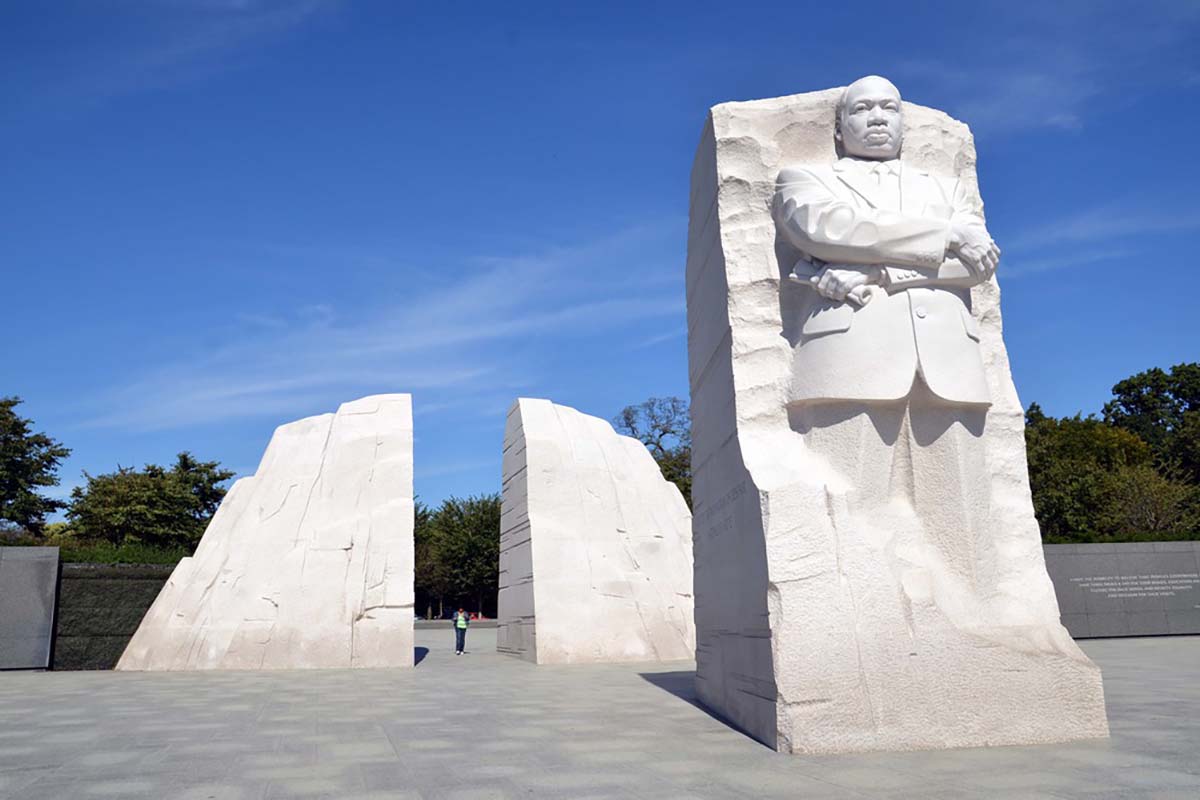
Part of the National Parks Service, the Martin Luther King Jr. Memorial in Washington D.C. memorializes Dr. King’s fight for civil rights in America. Within walking distance of the Lincoln Memorial, West Potomac Park, the National World War II Memorial, and so many other monuments, the relief sculpture of Martin Luther King Jr. stands at 30 feet tall.
The monument stands close to the location where Dr. King gave his universally known “I Have a Dream” speech. When it opened in 2011, it was only the fourth monument to honor a non-president and the first to honor a man of color. As a part of the National Mall, along with the statue, there is a wall of quotes from Dr. King’s civil rights career.
4. The Lion of Lucerne, Switzerland
The 200-year-old Lion of Lucerne is one of the most famous monuments in Switzerland. At over 32 feet long, the Lion of Lucerne was built to honor the Swiss Guards who defended the King of France in 1792. The statue was carved from a piece of sandstone from the quarry in Lucerne. The city of Lucerne is located in central Switzerland with many attractions and gorgeous mountain views.
The statue depicts a lion that has been stabbed by a spear. Next to the lion is a shield with the mark of the French monarchy. The Lion of Lucerne has been called the saddest monument in the world and “the most sentimental” statue in Switzerland. Panels were recently added in the park where the monument rests to recap the history and the importance of the memorial.
5. Christ the Redeemer, Brazil
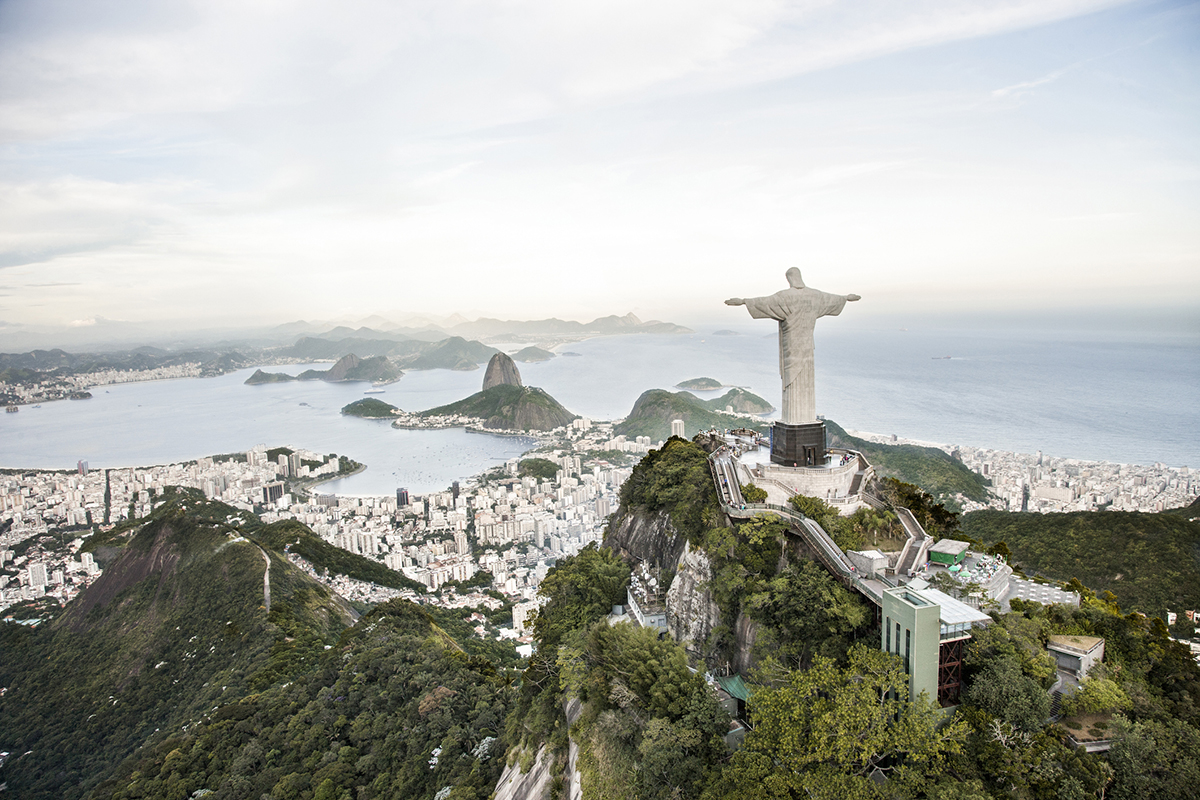
Located in the gorgeous coastal city of Rio de Janeiro, Christ the Redeemer is a 98-foot statue at the summit of Mount Corcovado. As one of the largest sculptures of Jesus in the world and the largest art deco statue on the planet, Christ the Redeemer is a stunning statue to visit whether you’re religious or not.
You can see this sculpture from the city, but to see it up close and personal, you’ll have to travel up the mountain. The cheapest way to do this is taking a 2-3-hour hike. You can also take a shuttle van up to the top, but it will cost you a little more. At 710 meters above sea level, you’ll get to be close to the stunning statue and take in the beautiful views of the city from a bird’s-eye view.
6. Petra, Jordan
Once a thriving city, the remains of the city of Petra lies in the beautiful caverns and desert of modern-day Jordan. Now a UNESCO Heritage site, Petra (meaning rock) was carved to create thousands of pinky-red temples, homes, and tombs out of sandstone. One of the few intact buildings you can visit today is the Khaznah, which is thought to have been a temple.
The prehistoric city of Petra is now one of the world’s most famous archaeological sites. At one point in history, the city was a cosmopolitan paradise. It boasted 200,000 citizens and elaborate water systems, and it was three times the size of Manhattan. With its Hellenistic architectural elements, Petra is a true sight to behold.
7. Leshan Giant Buddha, China
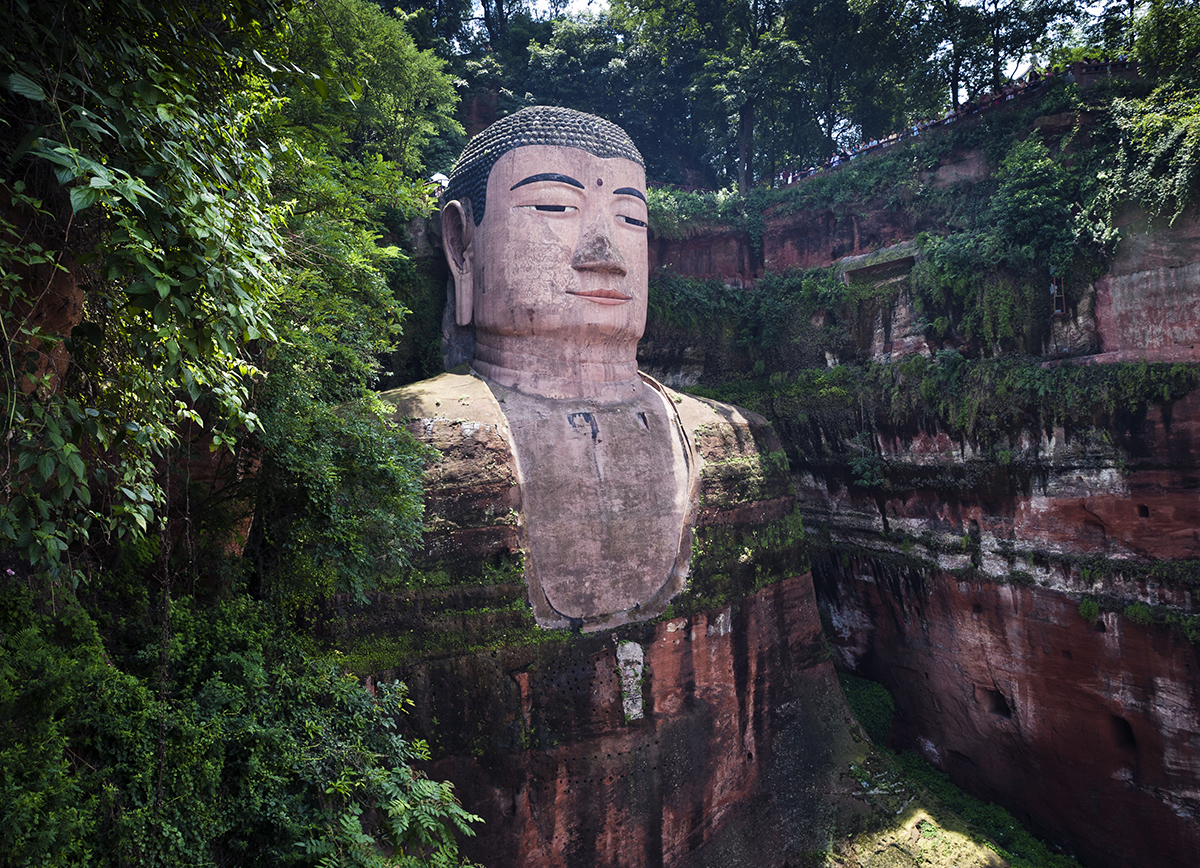
As the location of the first Buddhist temple in China, the summit of Mount Emei has become one of Buddhism’s most holy cities. It is home to the Leshan Giant Buddha, which was built under the Tang Dynasty. Mount Emei is located in eastern Leshan at the confluence of the Min, Qingyi, and Dadu rivers. The statue itself is 233 feet tall and is thought to be the tallest pre-modern statue, attracting millions of visitors every year. Mount Emei and the Leshan Giant Buddha became UNESCO Heritage sites in 1996.
You can visit the Leshan Giant Buddha by taking a high-speed train, or you can take a bus. After taking in the sites at Mount Emei, you’ll want to travel just a few towns over to see giant pandas in their natural habitat.
8. Gateway Arch, St. Louis, United States
Architect Eero Saarinen wanted to inspire U.S. citizens to explore new heights, so he designed the tallest monument in the world. You can see what the world looks like from 630 feet in the air by taking one of the arch’s trams to the top of the structure. You can also explore the six interactive exhibits at the Gateway Arch Museum. The Gateway Arch honors Thomas Jefferson and the pioneers who expanded the United States westward, as well as Dred Scott, who famously sued for his rights to freedom in the old Courthouse in front of the arch.
If you visit the Gateway Arch during the Fourth of July, you can take part in a fair in front of the arch, giving visitors a classic, hometown America feeling. With stunning views of the Mississippi River and St. Louis, the Gateway Arch may be the perfect place for your next sightseeing getaway.
9. Shapur Cave, Iran
In a cave in the Zagros Mountains of Iran, there’s a 22-foot sculpture of Shapur, the second ruler of the Sasanid Empire around 1,400 years ago. The Shapur Cave is one of the largest in Iran. Over the years, the sculpture has seen some wear and tear, specifically to its arms and legs.
The Shapur Cave is an excellent destination for art lovers and avid outdoor enthusiasts alike, thanks to the cave paintings inside and the treks to get to the entryway. If you’re going to explore the cave in depth, bring proper equipment and footwear. If you’re just looking to see the sculpture of Shapur, your adventure will be a little less intense, because the sculpture is near the entrance of the cave.
10. Elephanta Caves, India
The Elephanta Caves on Elephanta Island in Mumbai are a UNESCO Heritage site. The series of caves were carved from solid natural rock and feature relief sculptures of idols. The Elephanta Caves include both Hindu and Buddhist rock architecture. The Hindu caves were dedicated to the God Shiva and were a regular place of worship between the 5th and 8th centuries.
To get to the Elephanta Caves, you must take a ferry. Once you reach the island, you will have to walk a bit to reach your final destination. The best time to visit the caves is during the winter months. During the summer, the sea can become unpredictable and ferry shuttles shut down.
11. Lalibela, Ethiopia
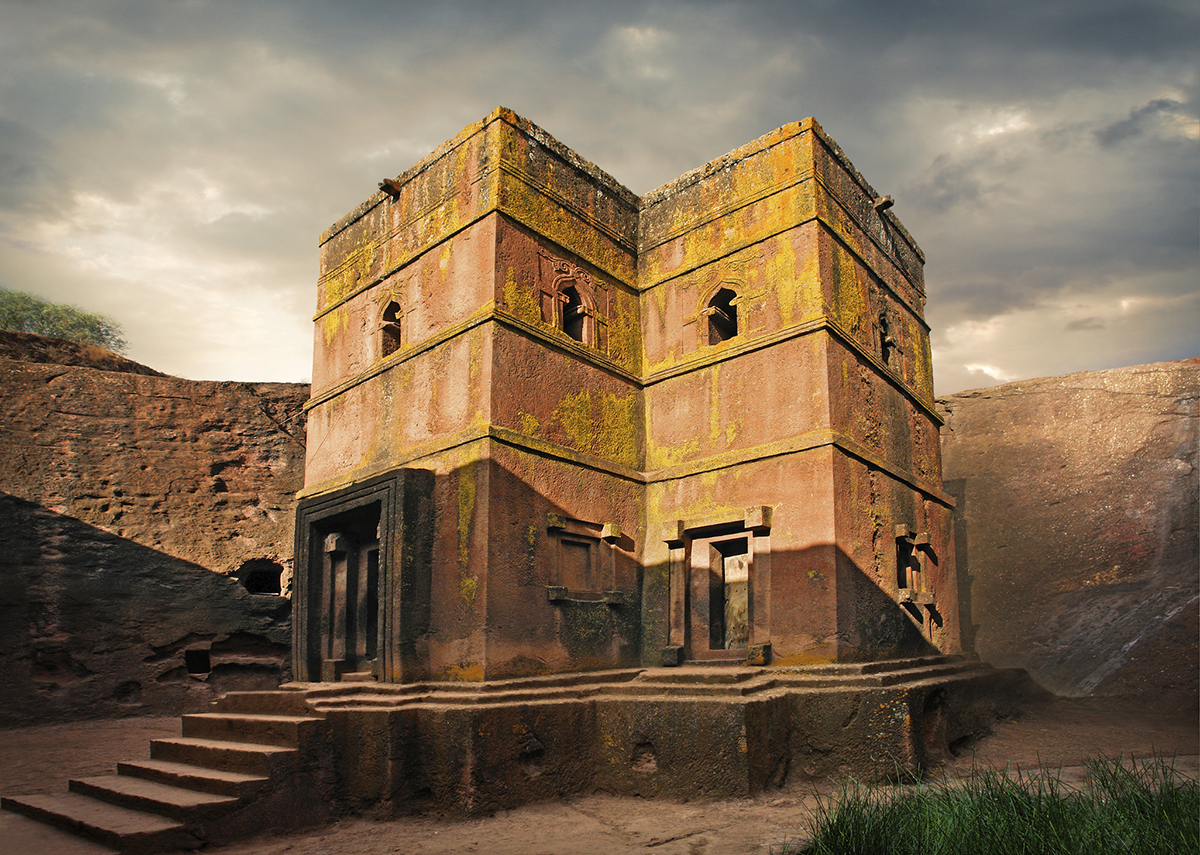
Another amazing UNESCO Heritage site to add to your must-visit list is the Lalibela, a set of 11 monolithic cave churches in the mountains of Ethiopia. King Lalibela commissioned the buildings in the 12th century to build a “New Jerusalem.” The original, historical name was Roha, and the site was the center of religious pilgrimage of the Zagwe dynasty.
The churches were built in two main groups with subterranean passageways, and they were constructed from monolithic blocks from below ground. They’re considered one of Africa’s finest sights, in addition to being one of Ethiopia’s holiest spots for Orthodox Christians.
The Lalibela churches are open for visits and pilgrimages. Whereas other locations on this list are historical monuments, Lalibela is still a working collection of churches.
12. Cappadocia, Turkey
Though technically not a sculpture or statue, this area of Turkey has been carved over time by wind and water. Described by some as a fairytale kingdom, the region of Cappadocia is made from expanses of volcanic rock that have been turned into caves, valleys, towers, and cones. There are also expanses of underground tunnels from the Byzantine and Islamic eras in history. Over the centuries, humans have carved underground dwellings into the soft stone, creating incredibly unique caves.
When you visit Cappadocia, you’ll want to go to the open-air museum, and you may even choose to stay in a cavern hotel. Cappadocia is known as the hot air balloon capital of the world, so when you visit, book a balloon ride to see aerial views of the city.
13. Statue of Decebalus, Romania
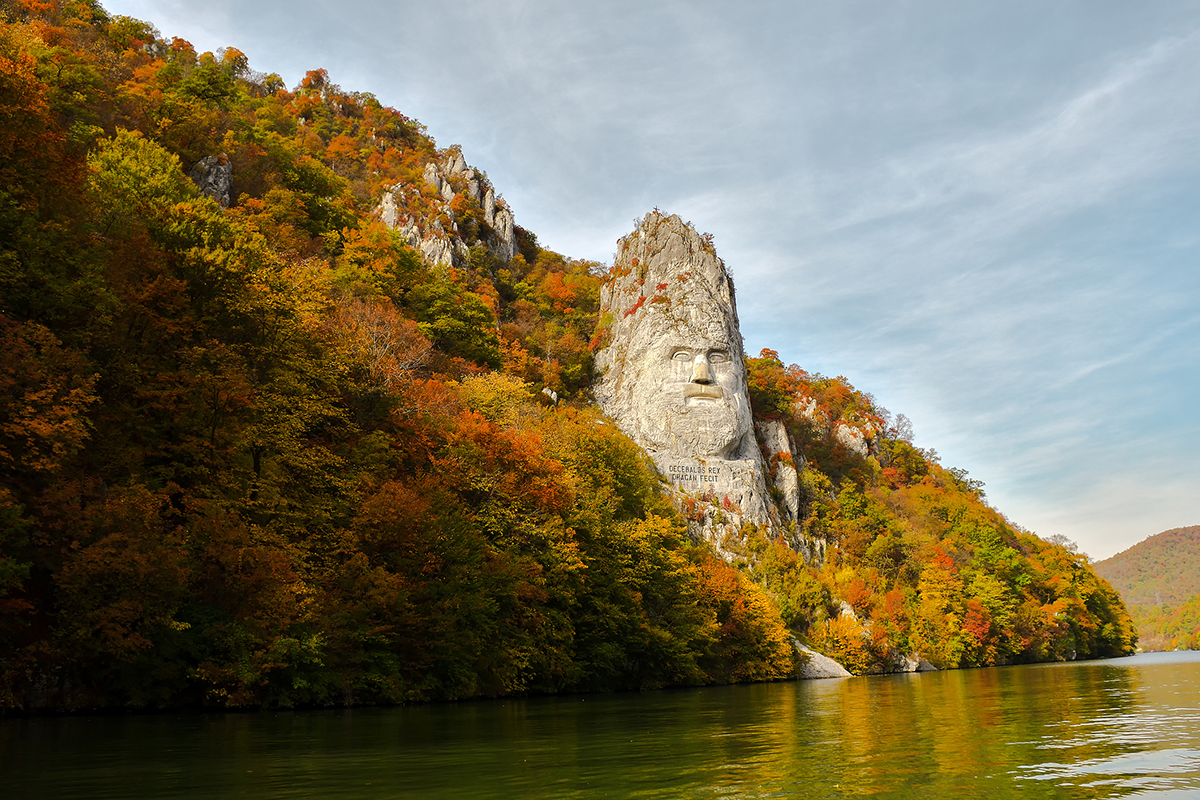
On the border of Romania and Serbia amid the stunning landscape overlooking the Iron Gates sits the largest rock sculpture in Europe, the statue of Decebalus. The relief depicts Decebalus, the last king of Dacia, and it’s the sixth-largest sculpture in the world at 141 feet tall.
Decebalus is known for protecting Romania from the Roman emperors Domitian and Trajan. Decebalus’s heroic efforts are part of the reason that modern-day Romania exists. It took 12 sculptors over nine years to finish the statue.
The best way to see the Statue of Decebalus is by car, as there are no trains or buses to the area. If you’re looking to see the other attractions in the area, there are also tours that include the statue.
14. Mount Rushmore, South Dakota, United States
Mount Rushmore in South Dakota is a colossal piece of art surrounded by history. The 60-foot faces of former presidents Washington, Jefferson, Roosevelt, and Lincoln are all carved into the side of a large piece of granite. The stunning sculptural work represents the birth and growth of the United States as a country. The four presidents chosen for Mount Rushmore are all recognized for their contributions to the United States and their promise to upkeep democracy.
Visit the sculptor’s studio to learn more about the carvings, then take a walk through the Black Hills National Forest to take in the gorgeous views of the surrounding area.
15. Dream, England
Dream is a 66-foot tall sculpture in St. Helens Merseyside, England designed by Jaume Plensa. The old mining town wanted to build a monument in the area to inspire future generations. The resulting statue is a young girl’s head and neck, her eyes closed in a state of dreaming. The bright white concrete was meant to contrast the coal mining done below the surface.
Sutton Manor, the location of Dream, used to be rather quiet. However, since the building of Dream, the area has become much more popular amongst locals and tourists alike. Although you’ll probably want to get up close to take in the beauty of this sculpture, it can also be seen from miles away, as its bright color makes it stand out in the English landscape.
If you’ve been looking for some travel inspiration or want to see some colossal artwork, these are places you’ll want to book a visit. Which is your favorite? Comment below.









